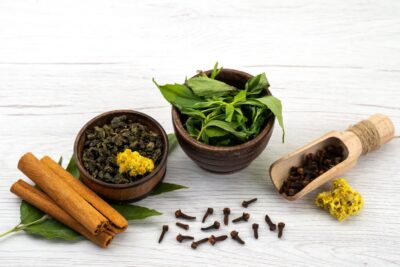100% Herbal & Natural |
Extra 10% OFF with code SATRISHI10 |
Backed by Ayurveda |
Free Shipping Above ₹399 |
100% Herbal & Natural |
Extra 10% OFF with code SATRISHI10 |
Backed by Ayurveda |
Free Shipping Above ₹399 |
100% Herbal & Natural |
Extra 10% OFF with code SATRISHI10 |
Backed by Ayurveda |
Free Shipping Above ₹399 |
100% Herbal & Natural |
Extra 10% OFF with code SATRISHI10 |
Backed by Ayurveda |
Free Shipping Above ₹399 |

Polycystic Ovary Syndrome (PCOS) is a hormonal disorder that affects many women, leading to symptoms like irregular periods, weight gain, acne, and fertility issues. While modern medicine offers treatments, Ayurveda, with its holistic approach, provides natural ways to manage PCOS by addressing the root causes, balancing hormones, and restoring overall health.
In Ayurveda, PCOS is primarily seen as an imbalance of the Kapha and Vata doshas, with some involvement of Pitta in certain cases. The buildup of toxins (ama) in the body, poor digestion, and a sedentary lifestyle contribute to the formation of cysts in the ovaries and hormonal imbalances.

Ayurveda recommends a combination of diet, lifestyle changes, and herbal remedies to manage PCOS effectively.
Ayurveda emphasizes the importance of a balanced diet to restore hormonal balance and improve digestion. For women with PCOS, dietary changes can significantly improve symptoms by reducing Kapha buildup and supporting Vata.
Ayurvedic herbs can play a crucial role in balancing hormones, regulating menstrual cycles, and reducing PCOS symptoms.
Benefits: Known as a female health tonic, Shatavari helps balance hormones, promote ovulation, and improve fertility.
Benefits: Ashwagandha reduces stress, which is known to aggravate PCOS. It helps in regulating cortisol levels and balancing hormones.
Benefits: Triphala supports digestion, detoxifies the body, and helps balance Kapha dosha. It is beneficial in weight management and reducing ama.
Benefits: Turmeric is a potent anti-inflammatory herb that helps reduce acne and inflammation associated with PCOS.
Benefits: Cinnamon has been shown to improve insulin sensitivity, a key factor in managing PCOS-related weight gain and blood sugar levels.
Ayurveda places a strong emphasis on lifestyle practices to balance the body’s energies and support hormonal health.
Regular physical activity is essential for managing PCOS and balancing the doshas.
Daily self-massage with warm sesame oil or coconut oil helps improve circulation, reduce stress, and balance Vata dosha. It also supports lymphatic drainage, which helps in detoxifying the body.
Since stress can worsen PCOS symptoms, it’s important to incorporate stress-relieving practices.
Ayurveda recommends regular detoxification to remove toxins from the body, especially for those with PCOS. Panchakarma, a traditional Ayurvedic detox therapy, helps in cleansing the body and balancing the doshas.
One of the key challenges in PCOS is irregular menstruation. Ayurveda focuses on bringing regularity to the menstrual cycle by balancing the doshas and using specific herbs.
For women with PCOS who are trying to conceive, Ayurveda offers natural ways to improve fertility by balancing hormones, supporting ovulation, and reducing stress.
Ayurvedic management of PCOS involves a holistic approach, focusing on balancing the doshas, improving digestion, detoxifying the body, and regulating hormones. With the right combination of a nourishing diet, herbal remedies, lifestyle changes, and stress management, women can naturally manage PCOS symptoms, improve their overall health, and restore balance to their bodies. While it may take time, the Ayurvedic approach offers sustainable, long-term relief for women dealing with PCOS.
No account yet?
Create an Account